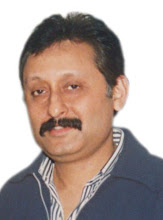 |
| Don Bradman practising with stump and golf ball. |
This is indeed an amazing
story of a simple country boy who traversed from a slab hut on his father’s
small farm in the village of Yeo Yeo in New South Wales to become the biggest
name that the game of cricket has known. His mother Emily (nee Whatman)
travelled twenty-five kilometres to give birth in a small nursing home run by a
lady by the name of Mrs. Scholz in a by-lane of the town of Cootamundra, around
380 kilometres south-west of Sydney. Baby Don was born in the front room, with
a log fire to keep the Australian winter away. The cottage on 89 Adam Street
became a museum, drawing hordes of cricket fans, His parents were Protestants,
second-generation immigrants from Suffolk, England, the original surname
believed to be Bradnam.
In 1911, when
Don was two-a-half years old, the family shifted to Bowral, now a ninety-minute
drive from Sydney, in order that his mother, who was keeping indifferent
health, would find its salubrious clime refreshing. The other reason, of
course, was that destiny beckoned the boy to come and chart the path laid out
for him.
The youngest of
five children - brother Victor, sisters Islet, Lillian and May - Don helped
father George with his woodwork, and as a young lad thought he would turn into
a house painter. Picturesque Bowral at 2000 feet in the Southern Highlands,
about 110 kilometres south of Sydney, did indeed suit the Bradmans. Its
equivalent in India might be Dehra Dun, a valley nestling at a similar altitude
between the Shivalik Hills and the foothills of the Himalayas. But this Dehra
Dun would not be the present capital of Uttarakhand, or even the earlier
bustling town of western Uttar Pradesh. It would actually be the Dehra Dun that
was a pensioners’ retreat and institutional haven of the first six decades of
the twentieth century, of grey hair and green hedges, of canals, monsoon rivers
and Irish bridges, of hills and forests, located equidistant from the holy
rivers Ganga and Yamuna. The Bradman family’s fortunes rocketed at Bowral, and
George Bradman became a builder in his own right. Within a decade they were
living in their three-bedroom bungalow on Shepherd Street, just across a large
park. All of Don’s siblings carved out good lives for themselves.
(Author
Indra Vikram Singh can be contacted on email singh_iv@hotmail.com
Follow
Indra Vikram Singh on Twitter @IVRajpipla).
Don’s Century
Published by Sporting Links
ISBN 978-81-901668-5-0, Fully Illustrated
French Fold 21.5 cm x 28 cm, 188 Pages
Price Rupees 995
Indra Vikram Singh’s latest books published
by Sporting Links:
A Maharaja’s Turf ISBN
978-81-901668-3-6
The Big Book of World Cup
Cricket ISBN 978-81-901668-4-3
Don’s Century ISBN
978-81-901668-5-0
Crowning Glory ISBN 978-81-901668-6-7
Distributed in India by: Variety Book
Depot, AVG Bhawan, M-3, Middle Circle, Connaught Circus, New
Delhi-110 001, India. Tel. + 91 11 23417175, 23412567.


No comments:
Post a Comment